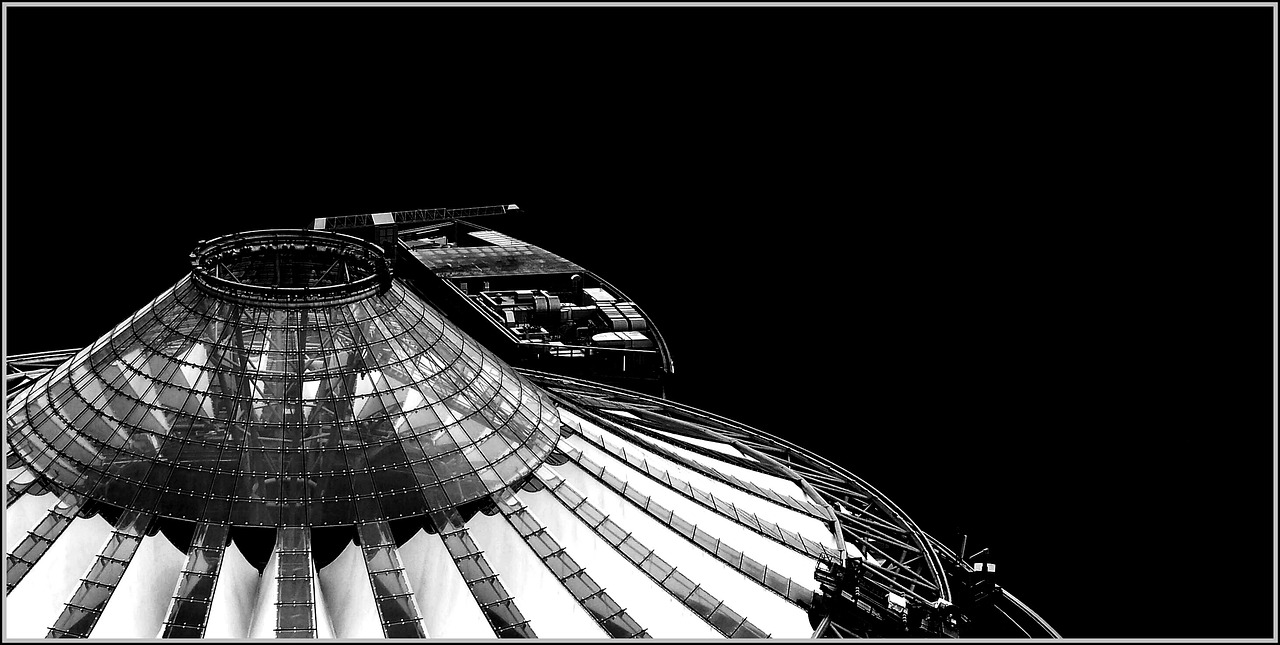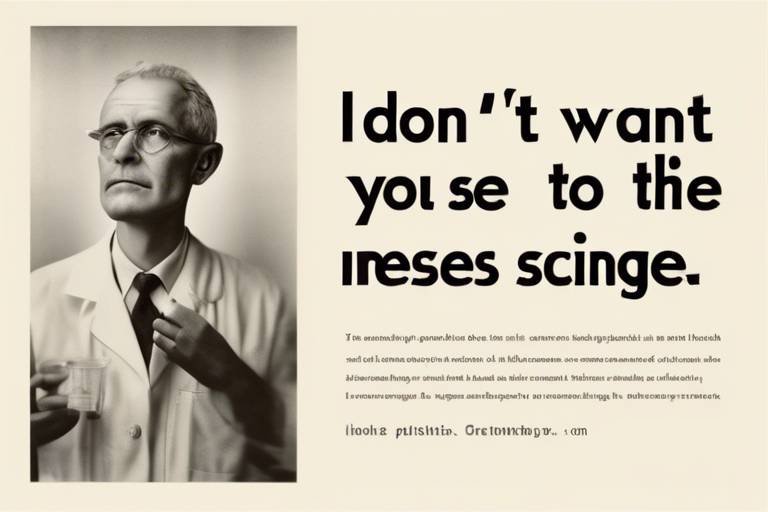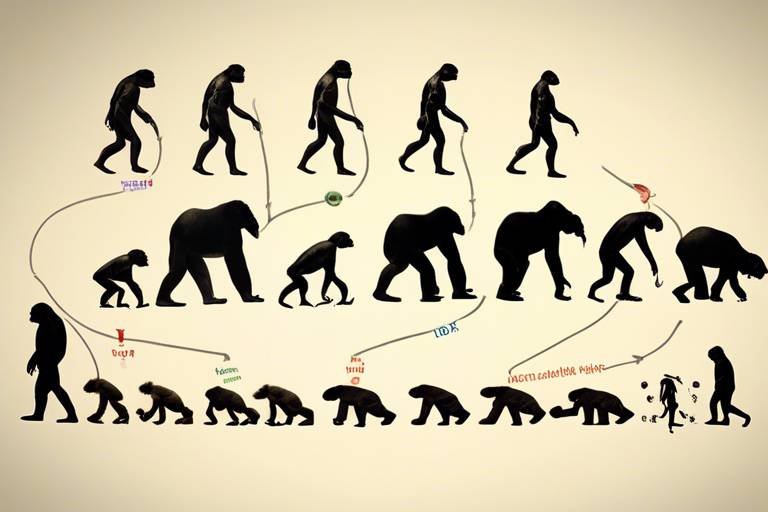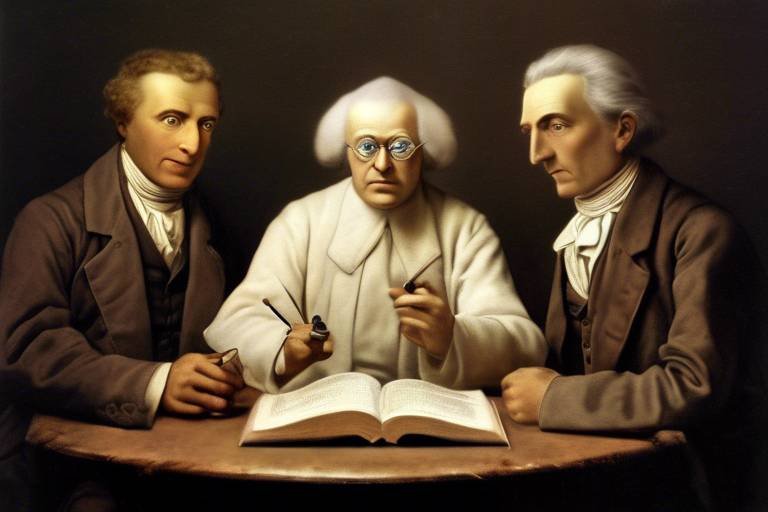Scientific Theories and the Problem of Induction
Induction is a fascinating and often perplexing aspect of scientific inquiry. It serves as the backbone of how we formulate theories and draw conclusions based on observations. Imagine you're a detective piecing together clues from a crime scene; each clue represents a specific observation, and through them, you strive to uncover a broader truth. This is precisely what scientists do when they utilize inductive reasoning to develop their theories. However, the relationship between scientific theories and induction is not without its complications. The philosophical problem of induction raises critical questions about the validity of our conclusions. Can we truly rely on past experiences to predict future events? This article delves into the intricate dance between scientific theories and the challenges posed by induction, exploring how this method of reasoning underpins scientific practice while highlighting the philosophical dilemmas that accompany it.
At its core, induction is a method of reasoning that allows us to draw general conclusions from specific instances. Imagine you notice that the sun has risen in the east every morning of your life; you might conclude that the sun will always rise in the east. This leap from specific observations to a general rule is the essence of inductive reasoning. In scientific inquiry, this process is crucial. Scientists gather data through experiments and observations, seeking patterns that lead to broader theories. However, the reliability of these generalizations is often questioned. Are we justified in believing that the future will mirror the past? This question is at the heart of the philosophical problem of induction, challenging the very foundation of scientific knowledge.
Throughout history, the problem of induction has sparked debates among philosophers. Figures like David Hume and Immanuel Kant have made significant contributions to our understanding of induction's limitations. Hume, in particular, famously questioned the justification of inductive reasoning. He argued that while we may observe patterns in nature, there is no logical basis for assuming that these patterns will continue. This skepticism forces us to confront the fragility of our scientific conclusions. Kant, on the other hand, sought to reconcile Hume's concerns by suggesting that our understanding of causality is not merely a product of experience but also a necessary condition for making sense of the world. These historical perspectives highlight the ongoing struggle to understand the role of induction in scientific practice.
Hume's skepticism about induction is a cornerstone of philosophical inquiry. He posited that our reliance on past experiences to predict future outcomes is fundamentally flawed. For instance, just because the sun has risen every day for thousands of years does not guarantee it will rise tomorrow. This line of thinking raises profound implications for scientific practice. If we cannot justify our inductive inferences, how can we trust our scientific theories? Hume's challenge invites us to reconsider the foundations of our knowledge and the methods we use to acquire it.
One of Hume's critical contributions to the discussion of induction is his analysis of causality. He argued that just because two events occur together does not mean one causes the other. For example, if we observe that ice cream sales increase during the summer, we might hastily conclude that ice cream causes warm weather. However, this correlation does not imply causation. This perspective is crucial for scientific reasoning and experimentation, as it encourages scientists to seek deeper explanations rather than relying on superficial correlations.
In response to Hume's skepticism, various philosophers have proposed alternative theories to reconcile induction with scientific practice. Some argue for a pragmatic approach, suggesting that while induction may not be logically justified, it is practically useful. Others have explored the concept of probabilistic reasoning, which allows for a more nuanced understanding of how we can make educated guesses based on available evidence. These responses highlight the ongoing dialogue within philosophy and science regarding the nature of induction and its implications for knowledge acquisition.
Despite the philosophical challenges posed by induction, it remains a fundamental aspect of contemporary scientific methods. Scientists continue to rely on inductive reasoning for hypothesis formation and testing. For instance, when developing a new drug, researchers gather data from clinical trials, observing how patients respond to the treatment. From these specific observations, they draw general conclusions about the drug's effectiveness. This process exemplifies how modern science embraces induction, navigating its philosophical complexities while striving for empirical truth.
Induction is intricately woven into the fabric of the scientific method. It plays a vital role in forming hypotheses, conducting experiments, and drawing conclusions from empirical data. The scientific method often begins with observations that lead to the formulation of a hypothesis. Researchers then test this hypothesis through experiments, collecting data that informs their conclusions. This iterative process underscores the importance of induction, as each step relies on the ability to generalize from specific instances to broader theories.
One of the most significant critiques of induction comes from philosopher Karl Popper, who introduced the principle of falsifiability. Popper argued that science should focus on disproving hypotheses rather than confirming them. This approach challenges the traditional reliance on induction, suggesting that a hypothesis is only scientific if it can be tested and potentially falsified. By shifting the focus from verification to falsification, Popper's philosophy reshapes the landscape of scientific inquiry, emphasizing the importance of rigorous testing and skepticism.
Despite its challenges, induction plays an essential role in scientific advancement. It contributes to the development of theories and the evolution of scientific knowledge. As scientists gather more data and refine their hypotheses, they build a more comprehensive understanding of the natural world. This iterative process of induction fosters innovation and discovery, driving the progress of science forward.
- What is induction in scientific reasoning? Induction is a method of reasoning that draws general conclusions from specific observations.
- Who challenged the validity of induction? Philosopher David Hume famously questioned the justification of inductive reasoning.
- How does induction relate to the scientific method? Induction is integral to forming hypotheses and drawing conclusions based on empirical data.
- What is Karl Popper's view on induction? Popper introduced the principle of falsifiability, suggesting that science should focus on disproving hypotheses rather than confirming them.

The Nature of Induction
Induction is a fascinating method of reasoning that allows us to draw broad conclusions based on specific observations. Imagine standing on a beach, watching the waves roll in. You notice that every time a wave crashes, it brings with it a handful of sand. Over time, you might conclude that all waves carry sand. This is the essence of inductive reasoning: taking particular instances and extrapolating them into a general rule. In the realm of science, this process is pivotal, as it underpins the way we formulate hypotheses and develop theories.
At its core, induction operates on the principle that patterns observed in the past will continue into the future. This belief is not just a whimsical notion; it's a cornerstone of scientific inquiry. However, the reliability of induction raises some intriguing questions. How can we be sure that what has happened before will happen again? This uncertainty is what makes induction both powerful and problematic. It’s like betting on a horse that has won every race so far—while the odds seem in your favor, there's always the chance that today could be different.
To illustrate the nature of induction further, let’s consider a few key characteristics:
- Empirical Basis: Inductive reasoning relies heavily on observations. Scientists gather data from experiments and real-world phenomena to inform their conclusions.
- Generalization: The process involves moving from specific instances to broader generalizations. For example, observing that the sun has risen every day leads us to conclude that it will rise again tomorrow.
- Probabilistic Nature: Inductive conclusions are not guaranteed; they are probabilistic. Just because something has happened consistently does not mean it will always happen.
In scientific practice, induction is often the starting point for developing hypotheses. When researchers notice a trend or a recurring phenomenon, they may propose a hypothesis to explain it. This hypothesis can then be tested through experimentation, allowing scientists to gather further evidence that either supports or refutes their initial conclusions. This iterative process—moving from observation to hypothesis and back again—is what drives scientific progress.
However, it’s essential to acknowledge the limitations of induction. While it provides a framework for understanding the world around us, it does not offer absolute certainty. The leap from observed instances to general rules can sometimes lead us astray. For instance, just because all observed swans are white does not mean all swans are white; the discovery of a black swan is a classic example of how induction can fail us.
In summary, the nature of induction is a complex interplay between observation, generalization, and uncertainty. It is a vital tool in the scientific toolkit, allowing us to make sense of the world, yet it comes with its own set of challenges. As we delve deeper into the philosophical implications of induction, we begin to appreciate its significance in shaping scientific knowledge and practice.

Historical Perspectives on Induction
The journey through the history of philosophical thought on induction is like traversing a winding road filled with intriguing ideas and profound questions. From the ancient philosophers who laid the groundwork for scientific inquiry to the modern thinkers who challenged established norms, the evolution of thought surrounding induction reveals a rich tapestry of intellectual exploration. One cannot discuss induction without acknowledging the pivotal contributions of figures such as David Hume and Immanuel Kant, who each grappled with the implications of inductive reasoning in their own unique ways.
In the early days, philosophers like Aristotle recognized the importance of observation in forming generalizations. However, it was in the 18th century that the problem of induction truly gained traction, particularly through Hume's skepticism. Hume argued that while we often rely on past experiences to predict future events, there is no logical basis to guarantee that the future will resemble the past. This radical skepticism raised questions that would resonate through the ages, forcing scientists and philosophers alike to reconsider the foundations of their reasoning.
Kant, on the other hand, sought to address Hume's challenges by proposing that while we cannot justify induction through pure logic, it is nevertheless a necessary aspect of human cognition. He introduced the idea that our understanding of the world is shaped by both experience and innate structures of thought, suggesting a complex interplay between empirical observation and rational deduction. This perspective opened new avenues for understanding how we can make sense of the world around us, even in the face of Hume's doubts.
As we delve deeper into the historical perspectives on induction, it's essential to recognize the various responses to Hume's problem. Philosophers such as John Stuart Mill and Charles Sanders Peirce offered alternative frameworks to reconcile the apparent contradictions of inductive reasoning. Mill proposed a systematic approach to induction, emphasizing the importance of controlled observations and experiments to establish causal relationships. Meanwhile, Peirce introduced the concept of abduction, a form of reasoning that allows us to generate hypotheses based on the best available explanations for observed phenomena.
To summarize the historical perspectives on induction, we can highlight some of the key figures and their contributions:
| Philosopher | Contribution |
|---|---|
| Aristotle | Emphasized observation in forming generalizations. |
| David Hume | Questioned the justification of induction, proposing that past experiences cannot guarantee future outcomes. |
| Immanuel Kant | Argued for the necessity of induction in human cognition despite Hume's skepticism. |
| John Stuart Mill | Developed a systematic approach to induction, focusing on controlled observations. |
| Charles Sanders Peirce | Introduced abduction as a means of generating hypotheses. |
These historical insights not only enrich our understanding of induction but also underscore the ongoing philosophical debates that continue to shape scientific inquiry today. As we move forward in this exploration of induction, we will see how these foundational ideas influence modern scientific practices and methodologies.
- What is induction in philosophy?
Induction is a method of reasoning that involves drawing general conclusions from specific observations. - Who are the key philosophers associated with the problem of induction?
David Hume and Immanuel Kant are two of the most significant figures in the discourse on induction. - How does induction impact scientific inquiry?
Induction plays a crucial role in hypothesis formation, experimentation, and drawing conclusions from empirical data.

David Hume's Skepticism
David Hume, a towering figure in philosophy, cast a long shadow over the realm of inductive reasoning. His skepticism about induction is not just a casual observation; it's a profound challenge that questions the very foundations of how we understand the world around us. Hume argued that while we often rely on past experiences to predict future events, there is no logical basis for assuming that the future will resemble the past. This notion can feel unsettling, as it suggests that our scientific endeavors might be built on shaky ground.
To illustrate Hume's skepticism, consider the classic example of a swan. If you've only ever seen white swans, you might confidently conclude that all swans are white. However, upon encountering a black swan, your previous conclusion is shattered. Hume's point is that no matter how many white swans you observe, the existence of just one black swan is enough to disprove your generalization. This leads to the crux of his argument: inductive reasoning lacks a rational justification.
Hume's skepticism extends beyond mere observations; it delves into the realm of causality. He questioned the assumption that correlation implies causation. For example, if you notice that every time you water your garden, the plants grow, you might conclude that watering causes growth. However, Hume would argue that you cannot definitively prove this causal relationship based solely on repeated observations. This challenges scientists to rethink how they establish causal links in their research.
In response to Hume's skepticism, various philosophers have proposed alternative theories to reconcile induction with scientific practice. Some have suggested that induction is a habit of thought rather than a strictly logical process. Others have explored probabilistic approaches, suggesting that while we cannot guarantee future outcomes, we can assign probabilities based on past experiences. Despite these attempts, Hume's original critique remains a significant philosophical hurdle that scientists must navigate.
In summary, Hume's skepticism about induction serves as a critical lens through which we can examine the validity of scientific reasoning. It compels us to question our assumptions and be cautious in our conclusions. As we engage with Hume's ideas, we not only enrich our understanding of scientific inquiry but also foster a deeper appreciation for the complexities inherent in the pursuit of knowledge.

Induction and Causality
When we think about induction, it’s impossible to ignore the concept of causality. Causality is the relationship between cause and effect, and it’s a cornerstone of how we interpret the world around us. But here’s the tricky part: just because two events occur together doesn’t mean one causes the other. This is where Hume's skepticism comes into play, challenging our assumptions about how we connect the dots between observations.
Imagine you’re a scientist observing a flock of birds. Every time the sun sets, you notice the birds fly south. Inductively, you might conclude that the setting sun causes the birds to migrate. However, Hume would argue that this is a leap of logic. Just because two events consistently occur together doesn't mean one is the cause of the other. There could be an unseen factor influencing both, or perhaps the birds migrate for reasons unrelated to the sunset. This is a classic example of the inductive reasoning dilemma.
To illustrate this further, consider the following table that summarizes the distinction between correlation and causation:
| Correlation | Causation |
|---|---|
| Two events occur together | One event directly influences the other |
| Can be coincidental | Requires a direct link |
| Does not imply a cause | Implying a cause requires evidence |
This distinction is crucial for scientific inquiry because if we mistakenly identify correlation as causation, we risk drawing incorrect conclusions. This is particularly evident in fields like medicine, where researchers might observe that patients who take a certain medication tend to recover faster. If they assume the medication is the cause without rigorous testing, they could promote ineffective or even harmful treatments.
Furthermore, Hume’s analysis of causality leads to a broader understanding of how scientists design experiments. To truly establish causation, scientists must not only observe outcomes but also manipulate variables in controlled settings. This is where the scientific method shines, allowing researchers to isolate factors and determine whether changes in one variable directly lead to changes in another.
In summary, the relationship between induction and causality is complex and fraught with challenges. As we navigate through scientific practice, we must remain vigilant about the conclusions we draw from our observations. By understanding the limitations of induction and the nuances of causality, we can enhance the reliability of our scientific knowledge and improve our methodologies. It’s a dance between observation and interpretation, where each step must be taken with care to avoid the pitfalls of assumption.
- What is the difference between correlation and causation?
Correlation indicates that two events occur together, while causation implies that one event directly influences the other. - Why is induction important in science?
Induction allows scientists to form hypotheses and draw general conclusions based on specific observations, guiding their research and experimentation. - How does Hume's skepticism affect scientific practice?
Hume's skepticism encourages scientists to critically evaluate their assumptions about causality and to seek evidence before concluding that one event causes another.

Responses to Hume's Problem
David Hume's skepticism about induction left a significant mark on the philosophy of science, prompting a range of responses from various thinkers. Many philosophers and scientists have sought to address the challenges posed by Hume's arguments, and their responses can be broadly categorized into a few key approaches. For instance, some have argued for a more pragmatic understanding of induction, suggesting that while we cannot fully justify inductive reasoning, it is a necessary tool for navigating the world. This perspective implies that the utility of induction in generating reliable predictions and guiding scientific inquiry outweighs its philosophical shortcomings.
One notable response comes from John Stuart Mill, who proposed a systematic method for establishing causal relationships. Mill's methods of induction, particularly his five methods of experimental inquiry, sought to provide a framework for identifying causal connections through careful observation and experimentation. This approach emphasizes the importance of empirical evidence in supporting inductive reasoning, offering a more structured way to validate scientific claims. Mill's work represents a shift towards a more scientific methodology that respects Hume's concerns while still finding a practical path forward.
Another significant response is found in the work of W.V.O. Quine, who challenged the distinction between analytic and synthetic truths, thereby reshaping how we understand scientific theories. Quine argued that our beliefs about the world form a web, where any change in one belief can affect others. This interconnectedness suggests that inductive reasoning is not merely about isolated observations but rather about how these observations fit into a broader framework of knowledge. By viewing scientific theories as part of a holistic system, Quine provided a way to reconcile induction with the complexities of scientific inquiry.
Moreover, the Pragmatist School, including thinkers like Charles Sanders Peirce, emphasized the practical consequences of belief over strict justification. They argued that the value of a hypothesis lies in its ability to lead to successful predictions and outcomes. This perspective allows for a more flexible interpretation of induction, where the focus shifts from the philosophical justification of inductive reasoning to its effectiveness in practice. In this view, induction is validated not by certainty but by its success in helping us navigate and understand the world.
Lastly, the concept of probabilistic reasoning has emerged as a modern response to Hume's skepticism. This approach acknowledges the uncertainty inherent in inductive reasoning and instead focuses on the likelihood of outcomes based on available evidence. By quantifying the degree of belief in a hypothesis rather than seeking absolute certainty, probabilistic reasoning provides a robust framework for scientific inquiry. It allows scientists to make informed decisions based on the best available evidence while accepting that future observations may challenge current theories.
In conclusion, while Hume's problem of induction presents a formidable challenge to the foundations of scientific reasoning, the responses from various philosophers and scientists illustrate a rich tapestry of thought that seeks to address these challenges. Through pragmatic approaches, systematic methods, holistic frameworks, and probabilistic reasoning, the scientific community continues to engage with Hume's legacy, finding ways to uphold the value of induction in the quest for knowledge.
- What is the problem of induction? The problem of induction questions the justification of inductive reasoning, which draws general conclusions from specific observations.
- Who is David Hume? David Hume was an 18th-century philosopher known for his skepticism about human understanding and the limits of inductive reasoning.
- How did philosophers respond to Hume's skepticism? Philosophers like John Stuart Mill, W.V.O. Quine, and proponents of pragmatism offered various frameworks and methods to address Hume's challenges.
- Is induction still used in modern science? Yes, induction remains a fundamental part of scientific methodology, particularly in hypothesis formation and testing.

Modern Applications of Induction
In the ever-evolving landscape of contemporary science, induction remains a cornerstone of hypothesis formation and testing. Imagine walking into a dark room and flipping a switch—what do you expect? You anticipate the light will turn on based on your past experiences. This is essentially how scientists operate: they observe specific instances and draw broader conclusions. However, the real magic happens when these conclusions lead to new questions and further exploration.
Inductive reasoning is not just a relic of philosophical debates; it is actively employed in various fields, from biology to physics, and even in social sciences. For instance, consider the field of medicine. Doctors often rely on inductive reasoning when diagnosing patients. They gather symptoms (specific observations) and infer potential illnesses (general conclusions). This method allows them to make informed decisions, even amid uncertainty. It's like piecing together a jigsaw puzzle where each observation is a piece that contributes to the larger picture.
Moreover, modern technologies, such as machine learning, heavily depend on inductive reasoning. Algorithms analyze vast amounts of data to identify patterns and make predictions. For example, a recommendation system on a streaming service uses past viewing habits to suggest new shows. It’s a sophisticated application of induction where the system learns from previous behaviors to predict future preferences. This is a prime example of how induction fuels innovation in the digital age.
Yet, the application of induction is not without its challenges. Scientists must remain vigilant about the limitations of their inductive reasoning. Just because a pattern has been observed in the past does not guarantee it will hold true in the future. This is akin to assuming that because the sun has risen every day, it will rise again tomorrow. It’s a reminder that while induction is a powerful tool, it is essential to approach conclusions with a degree of skepticism.
In summary, the modern applications of induction are vast and varied, permeating scientific inquiry and technological advancement. From diagnosing diseases to developing sophisticated algorithms, inductive reasoning is woven into the fabric of contemporary science. As we continue to push the boundaries of knowledge, understanding the role of induction will be crucial in navigating the complexities of our world.
- What is induction in scientific reasoning?
Induction is a method of reasoning that involves forming general conclusions based on specific observations. It is essential for developing hypotheses and theories in scientific inquiry.
- How does induction relate to scientific practice?
Induction allows scientists to draw conclusions from empirical data and make predictions about future occurrences based on past experiences.
- What are some examples of induction in everyday life?
Everyday examples include making predictions based on weather patterns or diagnosing a medical condition based on a set of symptoms.
- Why is induction considered problematic?
Induction is considered problematic because past observations do not guarantee future outcomes. This skepticism was famously highlighted by philosopher David Hume.

Induction in Scientific Methodology
Induction is not just a philosophical concept; it is a cornerstone of scientific methodology. When scientists embark on their exploratory journeys, they often start with specific observations and then leap to broader generalizations. This process, rooted in inductive reasoning, allows researchers to form hypotheses that can be tested through experimentation. Imagine you’re a detective piecing together clues from a crime scene. Each clue represents a specific observation, and from these, you build a theory about what happened. Similarly, scientists gather data from experiments and observations to construct a coherent understanding of natural phenomena.
The importance of induction in scientific methodology can be broken down into several key components. First, it aids in hypothesis formation. By observing patterns and regularities in data, scientists generate hypotheses that propose explanations for those patterns. For instance, if a biologist notices that a certain species of plant flourishes in a specific type of soil, they might hypothesize that the soil's composition is essential for the plant's growth. This hypothesis can then be tested, refined, or rejected based on further observations.
Next, induction plays a crucial role in conducting experiments. Once a hypothesis is established, scientists design experiments to test it. These experiments often involve controlled variables to isolate the effects being studied. For example, in our previous scenario, the biologist might create two groups of plants—one in the original soil and another in a different type—to see if the growth rates differ significantly. This method of testing allows for a systematic approach to understanding the relationship between variables.
Finally, the process of drawing conclusions from empirical data is heavily reliant on inductive reasoning. After conducting experiments, scientists analyze their results to determine whether they support or contradict the initial hypothesis. This step is akin to a judge weighing evidence in a courtroom. The more evidence that supports a hypothesis, the stronger the case becomes for that particular explanation. However, it’s important to note that while induction can suggest likely conclusions, it does not guarantee absolute certainty. Just as a jury might reach a verdict based on the evidence presented, scientists must remain open to revising their conclusions in light of new data.
To illustrate the integration of induction in scientific methodology, consider the following table that summarizes the key stages:
| Stage | Description |
|---|---|
| Hypothesis Formation | Generating testable predictions based on observations. |
| Experimentation | Designing and conducting experiments to test hypotheses. |
| Conclusion Drawing | Analyzing data to support or refute hypotheses. |
In conclusion, induction is not merely a philosophical debate; it is an essential mechanism that drives scientific inquiry. By allowing scientists to formulate hypotheses, conduct experiments, and draw conclusions, induction provides a structured approach to understanding the complexities of the natural world. However, it is crucial to recognize that while induction is a powerful tool, it is not infallible. Scientists must remain vigilant, ready to adapt their theories as new evidence emerges, ensuring that the pursuit of knowledge continues to evolve.
- What is induction in scientific methodology? Induction in scientific methodology refers to the process of deriving general principles from specific observations, allowing scientists to form hypotheses and conduct experiments.
- How does induction differ from deduction? Induction involves reasoning from specific instances to general conclusions, while deduction works from general principles to specific cases.
- Can induction guarantee scientific knowledge? No, induction can suggest likely conclusions but does not guarantee absolute certainty, as new evidence may challenge existing theories.
- Who are some key philosophers associated with the problem of induction? David Hume and Immanuel Kant are two prominent philosophers who explored the limitations and implications of inductive reasoning.

Falsifiability and Induction
When we dive into the realm of scientific inquiry, one name that often pops up is Karl Popper. He was a philosopher who threw a bit of a curveball at the traditional understanding of induction. You see, while induction involves drawing general conclusions from specific observations, Popper argued that this method is fraught with challenges. Instead, he proposed the idea of falsifiability as a cornerstone of scientific practice. But what does that really mean for induction?
To put it simply, Popper believed that instead of trying to confirm hypotheses through inductive reasoning, scientists should focus on how to disprove them. This approach shifts the emphasis from accumulation of evidence supporting a theory to looking for evidence that could potentially refute it. Imagine you're trying to prove that all swans are white. Induction would have you observe as many white swans as possible and conclude that all swans must be white. But what happens when you see a black swan? Suddenly, your hypothesis is in jeopardy. This is the essence of Popper's critique: no matter how many white swans you observe, you can never be certain that a black swan doesn’t exist somewhere.
This perspective has profound implications for how we conduct scientific research. It suggests that science is not about finding proof but rather about finding disproof. In this light, a scientific theory remains valid until it is proven false. This leads to a more dynamic understanding of scientific knowledge, where theories are constantly tested and refined. For instance, consider the following table that illustrates the differences between induction and falsifiability:
| Aspect | Induction | Falsifiability |
|---|---|---|
| Basis | Specific observations lead to general conclusions | Hypotheses are tested against potential refutations |
| Goal | To confirm theories | To disprove theories |
| Example | All observed swans are white, therefore all swans are white | Finding a black swan disproves the theory |
While Popper's approach has been influential, it doesn't completely dismiss the role of induction in science. In fact, induction still plays a vital part in hypothesis formation. Scientists often generate hypotheses based on observed patterns and data, which then undergo rigorous testing. However, the crux of the matter is that a hypothesis must remain open to falsification. In essence, while induction can help us formulate ideas about the world, it is the principle of falsifiability that ensures those ideas are robust and scientifically valid.
So, how does this all tie back to our understanding of scientific progress? Well, by embracing the idea of falsifiability, scientists can create a more resilient framework for inquiry. When researchers acknowledge that their theories can be challenged and potentially overturned, it fosters a culture of innovation and adaptability. In a way, it’s like navigating through a stormy sea; the more you prepare for the unexpected waves, the more adept you become at sailing through them.
In conclusion, while induction provides the groundwork for forming hypotheses, Popper's notion of falsifiability serves as a crucial check on scientific claims. It reminds us that in the pursuit of knowledge, it’s essential to remain skeptical and open to new evidence, ensuring that science continues to evolve and adapt as we uncover the mysteries of the universe.
- What is induction in scientific reasoning? Induction is a method where general conclusions are drawn from specific observations. It allows scientists to formulate hypotheses based on patterns observed in the data.
- How does falsifiability differ from induction? Falsifiability focuses on the ability to disprove a hypothesis, whereas induction seeks to confirm it through accumulating evidence.
- Why is falsifiability important in science? Falsifiability ensures that scientific theories remain testable and adaptable, promoting a more rigorous approach to understanding the natural world.

Induction and Scientific Progress
Induction is not just a method of reasoning; it is the very lifeblood of scientific progress. Imagine trying to build a massive puzzle without knowing what the final picture looks like. That’s what it feels like to conduct scientific research without the guiding principles of induction. By drawing general conclusions from specific observations, scientists can formulate hypotheses that lead to breakthroughs and innovations. This process is akin to navigating through a dense fog—each observation serves as a beacon that illuminates the path ahead, allowing researchers to make educated guesses about the unknown.
One of the most profound impacts of induction on scientific progress is its ability to foster creativity and innovation. When scientists observe patterns in data, they are not just tallying numbers; they are engaging in a dance of imagination. For instance, consider how the discovery of penicillin was not merely a stroke of luck but a result of inductive reasoning. Alexander Fleming observed that mold had a peculiar effect on bacteria, leading him to hypothesize its potential use as an antibiotic. This single observation ignited a revolution in medicine, showcasing how inductive reasoning can lead to groundbreaking advancements.
Moreover, induction allows for the iterative nature of scientific inquiry. Each experiment contributes to a growing body of knowledge, which in turn informs future research. This cyclical process can be visualized as a spiral staircase—each step upward represents a new understanding based on previous findings. For example, the advancements in quantum mechanics were built upon the inductive reasoning derived from earlier experiments in classical physics. As scientists continued to test and refine their theories, they were able to ascend to new heights of understanding, despite the complexities and uncertainties inherent in their field.
However, it's essential to acknowledge that induction is not without its challenges. The very nature of inductive reasoning means that conclusions drawn from limited observations can sometimes lead to incorrect generalizations. This is where the scientific community plays a crucial role. Through peer review and replication of experiments, scientists can validate or refute inductive conclusions, ensuring that progress is grounded in reliable evidence. This collaborative effort acts as a safety net, catching potential errors before they can mislead the scientific discourse.
In conclusion, while induction may present philosophical dilemmas, its role in driving scientific progress is undeniable. It equips researchers with the tools to explore the unknown, fosters innovation, and facilitates a collaborative environment that enhances the reliability of scientific knowledge. As we continue to push the boundaries of what we know, induction will remain a cornerstone of scientific methodology, guiding us through the intricate tapestry of discovery.
- What is induction in scientific reasoning?
Induction is a method of reasoning that involves drawing general conclusions from specific observations, allowing scientists to formulate hypotheses and theories based on empirical evidence. - Why is induction important for scientific progress?
Induction enables scientists to identify patterns and make predictions, fostering innovation and facilitating the iterative process of scientific inquiry. - How does induction relate to the scientific method?
Induction is integral to the scientific method as it aids in hypothesis formation, experimentation, and drawing conclusions from data. - What are the limitations of inductive reasoning?
Inductive reasoning can lead to incorrect generalizations if based on limited observations, which is why peer review and replication are essential in science.
Frequently Asked Questions
- What is induction in scientific reasoning?
Induction is a method of reasoning where general conclusions are drawn from specific observations. It's like noticing that every time you see the sun rise, it rises in the east, and concluding that the sun always rises in the east. This is a fundamental aspect of how scientists form hypotheses and theories based on empirical data.
- Who were the key philosophers that contributed to the problem of induction?
Key figures in the discussion of induction include David Hume and Immanuel Kant. Hume famously questioned the reliability of inductive reasoning, suggesting that just because something has happened in the past doesn't guarantee it will happen in the future. Kant, on the other hand, explored how our understanding of causality shapes our interpretation of inductive reasoning.
- What is Hume's skepticism about induction?
Hume's skepticism revolves around the idea that we cannot justify inductive reasoning. He argued that our past experiences don't provide a solid foundation for predicting future events. This raises significant questions about the validity of scientific knowledge, as much of science relies on induction to formulate theories and make predictions.
- How does induction relate to causality?
Hume's analysis of causality suggests that just because two events occur together, it doesn't mean one causes the other. This perspective challenges scientists to be careful about how they interpret correlations in their experiments, reminding them that correlation does not imply causation.
- What are some responses to Hume's problem of induction?
Philosophers have proposed various responses to Hume's skepticism, including the idea that induction is a habit of thought or that it is justified by its success in scientific practice. Others have suggested alternative theories, such as Bayesian approaches, which provide a framework for updating beliefs based on new evidence.
- How is induction used in modern scientific methodology?
In contemporary science, induction is crucial for hypothesis formation and testing. Researchers often start with observations, develop hypotheses, and then conduct experiments to see if their predictions hold true. Despite the philosophical challenges, induction remains a cornerstone of scientific inquiry.
- What is Karl Popper's critique of induction?
Karl Popper argued that science should focus on falsifiability rather than confirmation. According to him, instead of trying to prove hypotheses true through induction, scientists should aim to disprove them. This approach emphasizes rigorous testing and helps refine scientific theories over time.
- Why is induction important for scientific progress?
Induction plays a vital role in the advancement of science by allowing scientists to build and refine theories based on accumulated evidence. It helps in making predictions and understanding phenomena, driving the evolution of scientific knowledge as new observations are made and theories are tested.



















